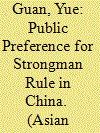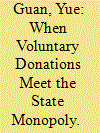|
|
|
Sort Order |
|
|
|
Items / Page
|
|
|
|
|
|
|
| Srl | Item |
| 1 |
ID:
192231


|
|
|
|
|
| Summary/Abstract |
After three decades of collective leadership, strongman rule has returned to China. But do the Chinese people prefer this political system, characterized by a leader with unchecked power? Using four waves of data from the World Values Survey, this study finds, first, that from 2001 to 2018, public preference for strongman rule in China was moderate compared to other countries. Second, the Chinese people expressed a growing desire for a strongman from 2001 to 2007 and again in 2012, but this desire did not increase further between 2012 and 2018. Third, in the 2000s, trust in the central government was negatively associated with strongman preference, while in the 2010s, perceptions of national crisis and political socialization became increasingly relevant. This study evaluates the degree, dynamics, and possible drivers of public preference for strongman rule in China and contributes to the understanding of political strongmen and their popular bases worldwide.
|
|
|
|
|
|
|
|
|
|
|
|
|
|
|
|
| 2 |
ID:
167073


|
|
|
|
|
| Summary/Abstract |
China's blood-borne HIV catastrophe in the 1990s prompted the government to adopt a blood-collection system that combines voluntary donations with the state's monopoly on blood services. Juxtaposing fieldwork and survey data, this study examines how the intricate interplay between government manoeuvres and citizen reactions has led to blood shortages that are serious yet manageable. This article reveals that even though voluntary blood donations are adversely affected by a public distrust of state-run collection agencies, owing to political concerns healthcare officials shirk from engaging with citizens to overcome the distrust. It also finds that the blood shortages are nevertheless largely manageable because the authorities have the capacity to recruit captive donors through work units, with the caveat that such captive practices are used sparingly. Overall, this study argues that the lack of state–society synergy in voluntary donations, while exacerbated by government involvement, is also partially remedied by the government's mobilization of captive donors.
|
|
|
|
|
|
|
|
|
|
|
|
|
|
|
|
|
|
|
|
|